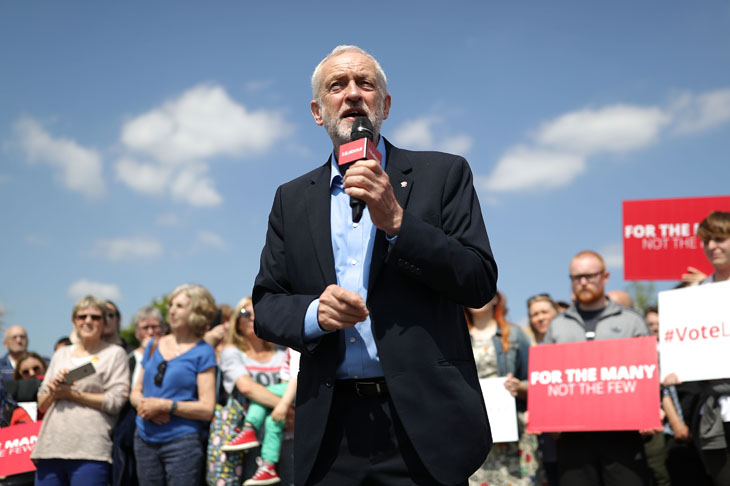It would be easy to dismiss Jeremy Corbyn’s launch of the Labour party’s election campaign this week on the grounds that hardly anyone believes he has the slightest chance of becoming prime minister. But given that David Cameron was given a 0.5 per cent chance of winning a majority, and Donald Trump a 1 per cent chance of the presidency, it would be foolish not to take the main opposition party seriously.
At the very least, Corbyn’s ideas need to be examined in order to understand why Labour finds itself in the position it does, and why no party leader to the left of Tony Blair has won a general election in over 40 years. It’s also worth asking how, more worryingly, the Conservatives seem to be being dragged to the left, as they take inspiration from Ed Miliband’s 2015 manifesto.
There is much truth in Corbyn’s analysis of what is wrong with our economy and society. The gap between rich and poor has not increased in a quarter of a century, but it remains too wide. The economy is, in many important respects, rigged against ordinary people. Rock-bottom interest rates, which suit the needs of a debt-addicted government, have stoked an asset boom which has hideously disfigured the British economy. It has hoisted up the property ladder and forced young people to save (and borrow) extraordinary amounts for modest flats. Those with the most assets — i.e., the wealthiest — become increasingly rich.
There are indeed companies involved in practices which are best described as ‘ripping off’ the public. Tax evaders do place a burden on those who do pay their taxes. There are ‘profiteers feeding off the NHS’ — namely the Private Finance Initiative (PFI) companies which Tony Blair and Gordon Brown enlisted in their great debt–concealment scam. As long as the true cost of the building stayed off the books, these companies were granted generous long-term contracts skewed against the interests of the taxpayer.
Corbyn’s problem is not that he sees and draws attention to these things. It is that he can see no good in people who make money. In his world, bankers are never anything other than greedy, bosses never do anything other than rip off the consumer, and the rich never pay their fair share of tax. Never mind that the highest-paid now give almost half of their money away to the government, and that the best-paid 1 per cent now contribute 27 per cent of income tax. In Corbyn’s mind, entrepreneurs are lumped together with cowboy car-clampers. They are all evil businessmen out to enrich themselves at everyone else’s expense.
His slogan ‘take our wealth back’ is indicative of the limitations of political philosophy. It implies that wealth is something that has in all cases been stolen from the workers. Where in this philosophy does the entrepreneur who comes up with a wealth-creating idea, then spends years trying to bring it to fruition, fit in? To Corbyn, the poor are poor because the rich are rich. Assets are things which have in some way all been stolen from common ownership. This is the zero-sum economics that John McDonnell, the shadow chancellor, believes in. McDonnell is, by his own admission, a Marxist: it makes sense for him to make such arguments. It makes less sense to hear a version of them repeated by Conservatives.
Philip Hammond, the Chancellor, has started to talk about tax that hasn’t been levied as being a ‘cost’ to the Treasury — a strange idea which implies that the Treasury has the right to everyone’s money and that the money the state decides not to take is somehow granted to the taxpayer. This could be dismissed as a clumsy verbal slip if it did not fit an overall pattern: since coming to power, Theresa May has sought to increase rather than lower taxes. She chastises Jeremy Corbyn for promising more tax and more debt, but she intends to do the same if elected. Mr Hammond has published plans that involve taking £130 billion a year more in tax (he has not said how he would collect it) and increasing the national debt by £175 billion.
May’s energy price cap embodies the strange adoption of failed Labour policy. The idea that prices can be regulated by state diktat has been tried out from time to time in various countries and always leads to disaster. It was depressing this week to see the energy companies left alone to point this out. Worryingly, businesses seem to be running out of allies. The Tories are too obsessed with Brexit to defend them.
There are votes in Jeremy Corbyn’s form of left-wing populism, perhaps enough to save his party from the worst-case scenarios that have been described. The best remedy to the unfairness which he outlines would be radical conservative policies of the sort which have been applied with such success to welfare (unemployment now stands at a 40-year low) and education (most secondary schools are now independent).
The Conservative manifesto is due to be published next week. Never have the Tories had so much political opportunity, or a greater hope of shaping the debate. It makes sense for Mrs May to pose as a social warrior, with so much still to accomplish. But she should arm herself with conservative ideas that work, rather than Labour ideas that don’t.
Got something to add? Join the discussion and comment below.
Get 10 issues for just $10
Subscribe to The Spectator Australia today for the next 10 magazine issues, plus full online access, for just $10.
You might disagree with half of it, but you’ll enjoy reading all of it. Try your first month for free, then just $2 a week for the remainder of your first year.














Comments
Don't miss out
Join the conversation with other Spectator Australia readers. Subscribe to leave a comment.
SUBSCRIBEAlready a subscriber? Log in